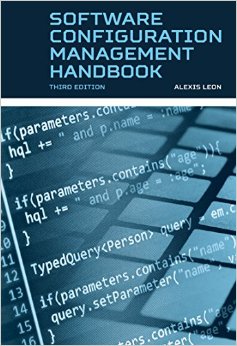This book is the third edition of the Software Configuration Management Handbook written by Alexis Leon. The first edition was first published in 2000. This books aims to explain what software configuration management is and how it should be practiced in the software development process.
The book covers completely the software configuration management domain from a presentation of the basic concepts to the implementation strategies. It is mostly focused on software configuration management with an engineering perspective. Most of the standards (IEEE or MIL-STD) and references cited in the book belong to the engineering or military areas. The book is written in a formal style that reminds me university textbooks. On the negative side, the vast majority of the references mentioned in the book are written before 2000 and its first edition. You will also see no real references to the situation of software configuration management in an Agile context or the more recent concepts like continuous integration, continuous deployment or devops.
I would recommend this book to software developers that work mostly in an industrial or defense software development context and want to get some basic theoretical knowledge about software configuration management.
Reference: “Software Configuration Management Handbook”, Third Edition, Alexis Leon, Artech House, 401 pages, IBSN 978-1-60807-843-1
Quotes
Boehm has said that talented people are the most important element in any software organization and that it is crucial to get the best people available. According to him, the better and the more experienced they are, the better the chance of producing first-class results. The problem with these geniuses, however, is that their capability to work as a team member, in most cases, will not be in the same class as their talent. Software development has become too complex and software systems so huge that it is not possible for one individual to complete a project regardless of talent. To develop software systems successfully, even the best and most talented professionals need a structured and disciplined environment, conducive for teamwork and cooperative development.
There are at least two truisms that fit most SCM projects: Implementation will be painful, and financial benefits realized in the first year will be minimal.

